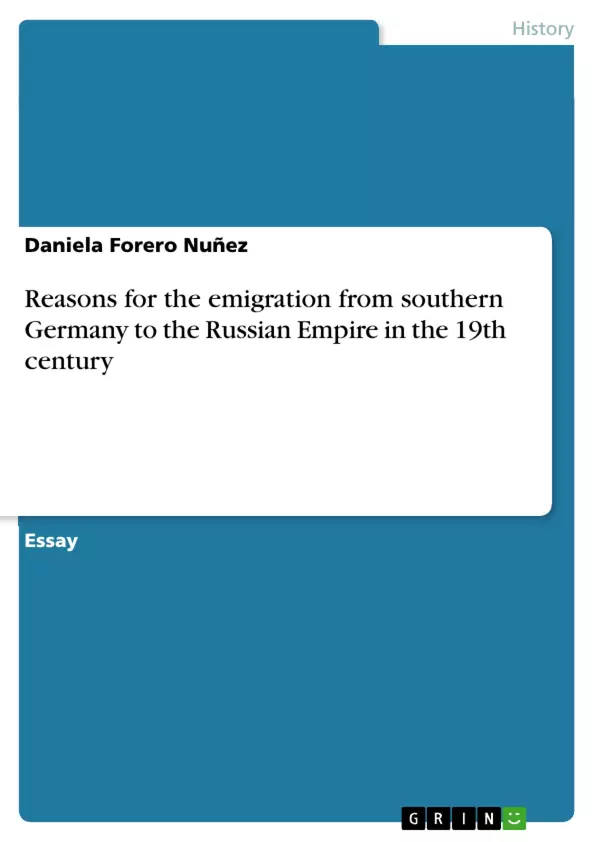The text attempts to explore the reasons of this emigration wave, taking into account some testimonies and narratives of emigrants that firmly decided to move towards a better life in unknown lands. The predominant debate concerning the reasons for emigrating focuses on whether the main motives for emigration were religious, political or economic. On one side, the pietist historiography and the testimonies of emigrants suggest that the massive migration movements in the first decades of the 19th century were mainly religious motivated. On the other hand, a contrary thesis introduced by the contemporary socio-historical migration studies assumes that economic and political factors -resulting from the crisis period at the beginning of the 19th - were the main reasons for leaving the region.
Migration processes have shaped the European history since the beginning of the humankind. Indeed, the conditions, motives and consequences of migration have evolved and adapted to the economic, political and social circumstances, nevertheless the willingness of acquiring better life conditions has never been fully attenuated. Perhaps migration and specifically the reasons behind it seem to be more present than ever. The topic of research of the following text focuses on the first decades of the 19th century and thematizes the reasons for the emigration from southern Germany, more specifically from Württemberg to the Russian Empire at the time.
Inhaltsverzeichnis (Table of Contents)
- Introduction
- Reasons for the emigration of southern Germany to the Russian Empire in 19th Century
- Religious reasons for the emigration from southern Germany to the Russian Empire in 19th century
- Economic and political reasons for the emigration from southern Germany to the Russian Empire in 19th century
- Testimonies and literary sources of immigrants in the Russian Empire in 19th century
Zielsetzung und Themenschwerpunkte (Objectives and Key Themes)
This text focuses on the emigration of southern Germans, specifically from Württemberg, to the Russian Empire during the early 19th century. It investigates the motives behind this wave of migration, exploring the role of religious, political, and economic factors. By examining testimonies and narratives of emigrants, the text aims to shed light on their decisions to leave their homeland for a new life in unknown lands.
- The influence of pietism and religious freedom on emigration decisions.
- The impact of economic hardship and political instability on emigration patterns.
- The role of Russian settlement policies in attracting immigrants.
- The diverse perspectives on the reasons for emigration, including religious, economic, and political motivations.
- The significance of the massive emigration of 1817 and the establishment of religious colonies in the Russian Empire.
Zusammenfassung der Kapitel (Chapter Summaries)
The introduction establishes the context of the emigration from southern Germany to the Russian Empire in the 19th century, highlighting the historical and social factors influencing migration decisions. It then explores the debate surrounding the primary motivations for emigration, specifically focusing on the role of religious, political, and economic factors. The text examines various arguments and perspectives from different authors and scholars, emphasizing the complexity of the reasons behind this historical migration event.
The chapter "Reasons for the emigration of southern Germany to the Russian Empire in 19th Century" delves into the religious aspect of emigration, defining pietism and its influence on the decision to emigrate. It analyzes testimonies of emigrants and historical accounts to demonstrate the role of religious freedom and intolerance in driving migration. The chapter further explores the attractiveness of the Russian Empire for pietist communities seeking religious autonomy and the establishment of religious colonies in the region.
The chapter "Religious reasons for the emigration from southern Germany to the Russian Empire in 19th century" examines the specific motivations of pietists for emigrating to the Russian Empire. It highlights the role of religious intolerance, the desire for religious freedom, and the appeal of religious autonomy within the Russian Empire. The chapter further examines the importance of the 1817 emigration wave and the impact of the establishment of religious colonies.
Schlüsselwörter (Keywords)
The primary keywords and focus topics of this text include: emigration, migration, southern Germany, Württemberg, Russian Empire, 19th century, pietism, religious freedom, religious intolerance, economic hardship, political instability, settlement policies, religious colonies, testimonies, narratives, historical accounts, migration studies, historical debate.
- Quote paper
- Daniela Forero Nuñez (Author), 2020, Reasons for the emigration from southern Germany to the Russian Empire in the 19th century, Munich, GRIN Verlag, https://www.grin.com/document/1035659



